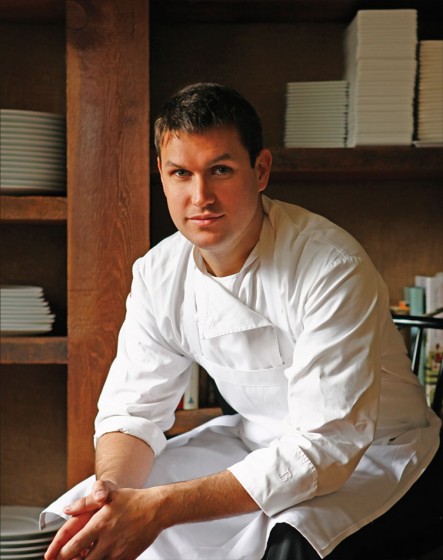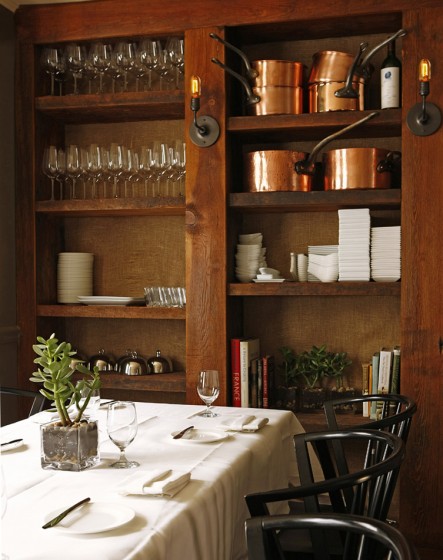I love being reminded that raw talent exists, sometimes in the most extraordinary ways.
A career at Le Bec Fin and Vetri, a successful catering company, and a handful of preeminent dining spots such as Mica of Chestnut Hill, are only a few of Chef Chip Roman’s accomplishments. However, I wanted to learn more about what motivates this well-known chef in this fast-paced business. Last month, I sat down with the casual kitchen crusader and let his mouth do more than taste testing for a change. Stories danced from stages with The French Laundry of California to his son’s lemonade sale during Fall for the Art’s Festival.
As each word slipped from his mouth, I was reminded of that raw talent. He has no longing to follow trends or comply with the average diner. For Chip, it’s all about a love for food and family, with a heaping side of passion.
There is always talk about “what’s next” but do you ever think about a finish line or what that would mean to you? Perhaps once an ultimate goal is achieved?
Chef Chip Roman: I don’t really see a finish line. I guess you could say I’m in a little bit of a lull right now. I have four kids so I’m just trying to balance work and family life. It is difficult but maybe once I get that all figured out. I mean I can only cook in so many buildings, so I definitely invest in staffing a lot more than I used to because I’ve realized I can’t do it [work at all three restaurants] by myself anymore.
The balancing act must be hard. What’s your schedule like right now as you juggle so many items?
CR: I make my own schedule and kind of go where I’m needed on any given day. Restaurants are kind of like children. Sometimes one of them needs more attention than the others.
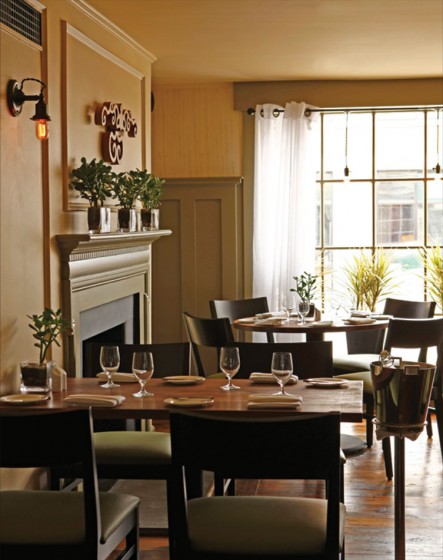 You mentioned investing in staff more so now than ever before. What is your training program like?
You mentioned investing in staff more so now than ever before. What is your training program like?
CR: They all start from the bottom and work their way up. Any guy that I think can even be a manager will start at the bottom. It doesn’t matter what their resume says. If they’re going to work with me then they have to know my procedures, my quirks, and that’s the best way to learn them.
What are some of those quirks?
CR: Umm, I don’t even know. [He smiles] The kitchen team could probably let you know better than I could.
So a lot of people in the media and restaurant reviews compare you to other successful chefs in the area. Does that fuel a competitive fire in you?
CR: I am very competitive but right now, like I said, I’m just trying to sustain quality and sustain service. I’m not pushing to open a new location and I’ve reverted back to some of the more classics dishes that I’m known for versus constantly pushing the envelope. Mainly because I have four kids in under five years. When I opened Blackfish seven years ago I didn’t have any kids. Even up to two years ago I was still pushing the envelope but now I have three restaurants and the catering business.
The restaurant world and catering world have very different aspects to them. Do you prefer one over the other?
CR: Catering is tough because you have to look at it a totally different way. The fact is you can’t maintain the same quality in catering that you can at a restaurant. You can but it would be extremely, extremely expensive. I think as a restaurant chef it’s hard sometimes because, you’re not sacrificing quality, but the dishes are much more classic. A lot of the guys that work with me are used to doing more modern stuff and complex dishes then we get on a catering job and it’s beef, potatoes, vegetables. We’re almost underwhelmed with the food. As far as which one I like better, I sell all the catering jobs myself and I like the selling aspect. It gets me out of the kitchen. But still, I don’t know which one is my favorite.
What’s your approach there? How do you develop new clients to make the sale?
CR: It’s all word of mouth. I have the three restaurants to be recognized by and we market it, but never push it in your face. There’s plenty of stuff online about Charles Roman Catering as well. I just really like the business aspect. Sometimes I get in too over my head and may be a little ambitious though.
Can you recall a specific time when you let that ambition get the best of you in the catering world?
CR: There was this one time when I was younger where I booked nine parties for one night, each for over 100 people. It was a shit show. I had a lot of staff call out. I definitely bit off more than I could chew but I will never make that mistake again.
Speaking of mistakes, there are many chefs who attempt to achieve your accomplishments. They open one BYOB and then one more but eventually fall off the grid for one reason or another. What’s your secret to staying consistently successful?
CR: Right now, in my mind, it’s not as successful as people see it. That’s because I’m taking a step back. Maybe it’s not a lull as I said earlier but I’m re-evaluating things. It can always be better. Plus, now it’s not me doing everything so I always have to make sure what I’m putting out is an exact replication of my personal creations. The reality is I’m not going to miss my kid’s soccer game to give someone chicken. Or karate or a ballet recital. That’s just life! At the same time, this job is how I keep my family fed and happy so, it may sound contradicting and that’s why I’m still figuring it out.
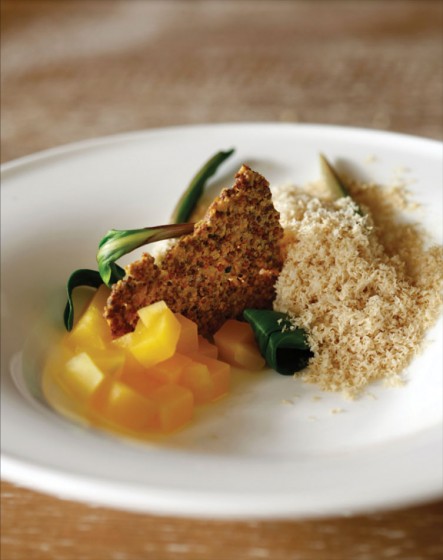 So before this step back that you’re currently taking, what were you doing to stay competitive with other restaurants and the chefs you’ve been compared to?
So before this step back that you’re currently taking, what were you doing to stay competitive with other restaurants and the chefs you’ve been compared to?
CR: I used to do a lot of stages. I would go to other parts of the country and work at another restaurant for a week. My two favorites were French Laundry, where I stayed for a couple weeks and Blue Hill at Stone Barns, which is in New York. I absolutely took away things from there that I couldn’t read in a book or ever see on television. You can read the French Laundry cookbook and it seems complicated but when you actually see people do it, it’s easy. Maybe not easy, but you know.
It’s a team effort. Like Jason Cichonski at ELA (Chip’s third restaurant in Philadelphia), we talk every day. He’s taken the lead so a lot of the ideas are his ideas. We work on them together but I’m more in the mentoring position now. I like to let them take the lead role but they do call me out for micromanaging every once and awhile.
Craig Laban has said that your influences from Drexel, Le Bec Fin, Vetri and Charles Roman Catering “are simply a starting point.” Where else do you draw inspiration and techniques from?
CR: Food is definitely more modern here than what I saw at Vetri or Le Bec Fin. I kind of got caught up in the molecular gastronomy techniques. I never did it too much. My main objective is to keep the guests entertained and keep them coming back. We [Chip and his kitchen crew] look to Eleven Madison Park (New York) if we’re in need of inspiration now. That place noma (Copenhagen) is pretty cool. We’ve had guys do stages there too. We had someone there for four months and then they came here to learn.
What are your thoughts on some current food trends or movements that are happening in the Philadelphia area right now or in the past five years?
CR: I couldn’t tell you what they are. I’m sort of backing off the craziness right now anyway. I’m not a huge fan of farm to table. Not to say that I don’t promote freshness and supporting local businesses but, at the end of the day, everything comes from a farm. Many diners, and even some chefs, wouldn’t know if their dinner came from 6 miles down the road or 600 miles. I mean Gary at Maple Acre Farms up the street has awesome corn but, unless you have one of those crazy palates, you wouldn’t be able to tell it apart from North Carolina corn. Maybe I’m wrong but I just don’t buy into it. Some people do it really great though like The Farm and the Fisherman. The truth is it’s really hard to do farm to table in this region during the winter but, for the record, all my stuff comes from a farm. Everything does.
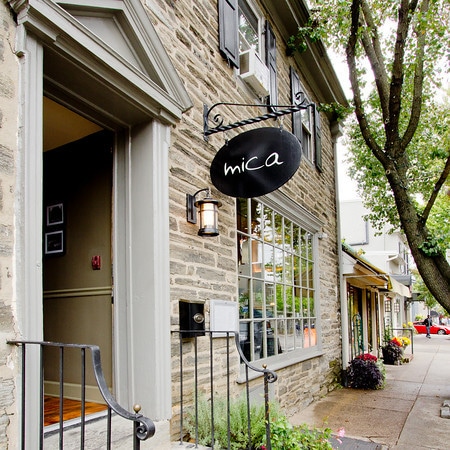 You’ve talked pretty heavily about balancing work and family life and I’ve read that your wife does a lot of cooking at home. Is there any time when your two worlds collide?
You’ve talked pretty heavily about balancing work and family life and I’ve read that your wife does a lot of cooking at home. Is there any time when your two worlds collide?
CR: They do. For example, this past weekend in Chestnut Hill, there was a festival so my six year old and five year old came and were pouring lemonade for people. I think my son made $17 and he was thrilled. They have fun. Sometimes they come and just put ice in cups but I like those opportunities because it teaches them this is where your things come from. My wife does all the bookkeeping for my businesses. There is nobody more trustworthy than that. My brother is getting married this weekend and he met his wife at Blackfish. I’m into fishing so I take my son out and we’ll catch tuna or striped bass. I bring the fish back to the restaurant and prepare them in front of him, so the two worlds do mingle in many regards.
Does a part of you already hope that one of them grows up to be a chef?
CR: No. Absolutely not. If they want to then by all means. It’s not a tough life for the right person. For me, I love it. I don’t feel like I work every day of the week. I’ve probably worked seven days a week for the past five years but I couldn’t tell you. I’m not always here but I’m always in contact.
We were interrupted by work seekers. Chip confidently sent the two men to the kitchen where I imagine his well trained crew knew exactly what to do. As I attempted to revisit our conversation, he wittingly chimed in, “we were probably talking about how handsome I am. My hair’s not good today though.”
It was 4 p.m. on a Wednesday. His three restaurants were only a few hours from transforming into packed houses. Still, Chip finds time to joke about his hair right before dashing out the back kitchen door.
Find Mica Restaurant at 8609 Germantown Avenue in Chestnut Hill, or online at micarestaurant.com.
Photographs credited to and courtesy of Mica Restaurant. Exterior photograph of Mica credited to Nina Cazille.
